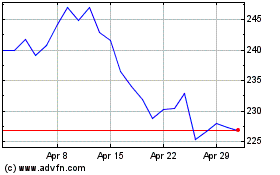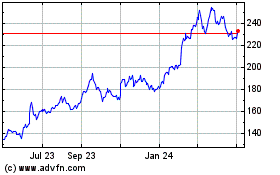Toyota Lowers Profit Forecast -- WSJ
August 05 2016 - 3:02AM
Dow Jones News
Japanese auto maker says the stronger yen and challenges in U.S.
will curb its outlook
By Sean McLain
TOKYO -- Toyota Motor Corp. ratcheted down its earnings outlook
after its first-quarter profit slid as the yen strengthened,
becoming the latest major auto maker to raise a caution flag about
slower growth in the U.S. and a murky global economy.
The world's No. 1 auto maker in terms of sales, Toyota has
posted lower sales in the American market as consumers flock to
sport-utility vehicles and pickup trucks. While the Japanese
company has made considerable changes in recent years to increase
the number of light trucks in its mainstream and high-end Lexus
lineups, it is still far more dependent on passenger cars for
volume, such as the Camry family sedan and Prius hybrid.
Toyota cut its full-year profit outlook 3% to Yen1.45 trillion
($14.3 billion). Its prior forecast, given in May, had already
projected a profit decline of more than one-third compared with the
prior financial year in response to currency headwinds.
Historic weakness of the yen versus the dollar played an
influential role in Toyota's run as one of the most profitable car
companies in the world.
Other Japanese auto makers, including Honda Motor Co., Nissan
Motor Co. and Subaru parent Fuji Heavy Industries Ltd., also have
blamed a stronger home currency for recent earnings weakness. A
stronger yen raises the cost of products Japanese companies sell
abroad, and erodes those profits when they are repatriated.
As the U.S. automotive market plateaus after six years of strong
growth, mass-market manufacturers are painting a mixed picture.
General Motors Co. has projected continued momentum for U.S.
competitors, but Ford Motor Co. -- the market's No. 2 seller, after
GM -- said its 2016 outlook is in danger because of expected
softness in second-half sales.
Toyota's U.S. sales fell 2.5% in the first half, and its
premium-brand sales dropped more than 4%, as buyers ignored the
luxury sedans, SUVs and crossover wagons that Toyota has in its
portfolio. The Japanese auto maker also lacks the significant
presence in the highly profitable pickup segment that has allowed
Ford, GM and Fiat Chrysler Automobiles NV to offset pockets of
weakness in the U.S. market.
"Trucks and SUVs are 61% [of the U.S. market]; that is probably
a record, " said Tetsuya Otake, Toyota's managing officer. To catch
up in that segment, the company will increase production of its
Highlander and Rav-4 SUVs with the aim of selling 30,000 additional
vehicles in the financial year ending next March.
Toyota has been expecting a sharp drop in earnings from the
Yen2.31 trillion it reported for its previous fiscal year.
Toyota has maintained a strong manufacturing base at home,
producing roughly three million vehicles in Japan. Rivals Honda and
Nissan receive a much smaller percentage of their sales from
Japanese exports.
When a weak yen drove record profits, Toyota's production policy
seemed like sound business judgment. But now Toyota plans to make
more vehicles and source more parts in the U.S. to soften the
impact of the strengthening yen, Mr. Otake said.
Toyota won't cut production in Japan, but will cut costs
instead, Mr. Otake said. "The cost competitiveness of Japanese
production should be enhanced," he said.
Toyota's first-quarter profit declined 15%, as the adverse
exchange rate erased Yen235 billion from operating income.
Toyota had predicted an exchange rate of 105 yen to the dollar
for the year, but the yen is trading closer to 102 to the dollar.
For the full year, Toyota expects a strong yen to reduce its
operating income by Yen1.12 trillion.
The company reported a Yen552.4 billion profit for the
April-June period, compared with Yen646.4 billion for the same
period last year.
Some analysts say Toyota is being overly cautious with the
earnings revision. "It seems a little hair-trigger on their part,"
said Christopher Richter, a Tokyo-based auto analyst at CLSA. At
Toyota's current pace, the company will easily beat its grim
earnings prediction for the year, he said.
Toyota has weathered yen strength before, and is better suited
to handle an unfavorable exchange rate now than in the past, thanks
to the company's cost-cutting and efficient operations, Mr. Richter
said. it shut down two elevators in its Tokyo office
The auto maker is famous for its ability to quickly cut costs.
Last month, Toyota said it shut down two elevators in its Tokyo
office to cope with the yen's rise. In response to the Brexit vote,
which caused the value of the British pound to drop sharply, the
company launched "emergency profit improvement" at its U.K.
operations, Toyota's Mr. Otake said.
Write to Sean McLain at sean.mclain@wsj.com
(END) Dow Jones Newswires
August 05, 2016 02:47 ET (06:47 GMT)
Copyright (c) 2016 Dow Jones & Company, Inc.
Toyota Motor (NYSE:TM)
Historical Stock Chart
From Jun 2024 to Jul 2024

Toyota Motor (NYSE:TM)
Historical Stock Chart
From Jul 2023 to Jul 2024
